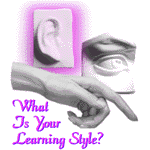About Auditory Learners
About Auditory Learners
 We learn by "seeing it" (visually), "hearing it" (auditorily), or "moving and doing it" (kinesthetically), and most of us have one primary learning style through which we best learn and remember information. All of us can benefit from identifying and understanding our individual learning styles.
We learn by "seeing it" (visually), "hearing it" (auditorily), or "moving and doing it" (kinesthetically), and most of us have one primary learning style through which we best learn and remember information. All of us can benefit from identifying and understanding our individual learning styles.
I'm All Ears!
Many years ago, Sam walked into my classroom. He carried with him one of the emptiest backpacks I had ever seen. As we began class that first day, I knew immediately that there was something different about this child. While other students were retrieving notebooks, paper, and pencils from their bags, Sam looked around the room, humming. He was one of the friendliest people I had ever met, and one of the most auditory learners I had ever known.
To an observer, it would appear that he had "checked out." Sam never wrote things down, unless he was drawing a picture in his art tablet, and he was usually singing or talking to those around him. Written tests were impossible, often resulting in a failing grade. However, when I requested information from him verbally, Sam was able to tell me more about the subject at hand than most students in the class.
Auditory learners process information that they hear. These students "filter incoming information through their listening and repeating skills. The auditory learner tells wonderful stories and solves problems by 'talking' about them." (School Smart Kids Newsletter, Volume 1, No. 4, The Center for New Discoveries in Learning, June 1996.). Auditory learners rarely take notes, and are easily distracted by sounds in the classroom. They can be good listeners, but are anxious to talk, thriving in discussions, debates, and speeches. Implementing simple strategies can greatly facilitate the auditory learner in the classroom and at home.
Strategies for Auditory Learners
- Study with a friend or parent to talk about information.
- Read books, articles, notes, and directions out loud.
- Tape record lectures, rather than taking written notes.
- Do oral reports or turn in tape whenever possible.
- Dictate written assignments into a tape recorder, or to someone willing to be your scribe.
- Listen to books on tape (texts and literature books are available on tape through your school or local library).
- Use a voice-recorder to keep track of assignments and projects. Keep it with you at all times to record reminders, ideas, memos, etc.
- Transfer important facts and information into songs or poems.
- Repeat vocabulary words and definitions into a recorder or out loud.
- Create flash cards and use them to play your own version of Jeopardy.
- Create an oral journal. Tape record daily events, special trips, and vacation memories.
- Develop a Reading Incentive Program. Have your kids read books out loud or listen to books on tape. Establish rewards for each completed book, oral report, or project.
- Visit a local radio station. Auditory people make terrific disc jockeys!
- Attend special lectures, discussions, or walking tours.
- Narrate a special video of historical and interesting sites in your area.

